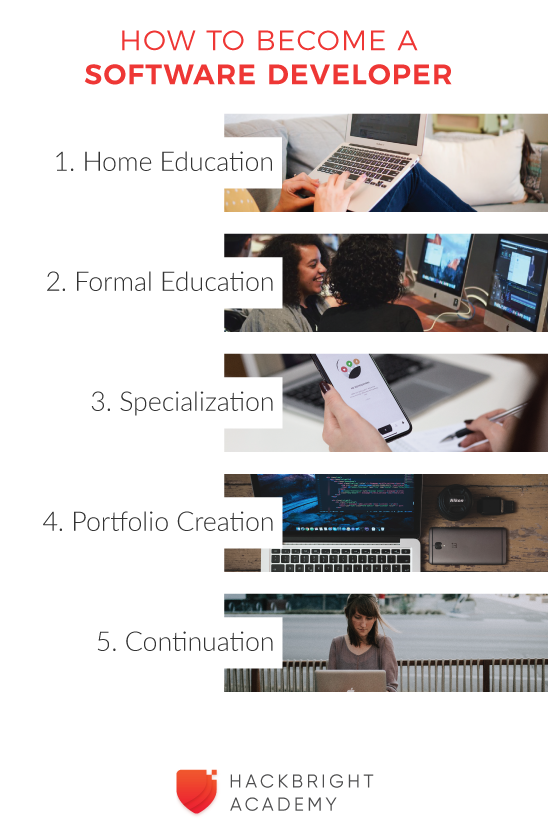Becoming a software engineer is a rewarding career choice. It offers numerous opportunities in the tech industry.
But how does one become a software engineer? Software engineering is a field that combines creativity with technical skills. It involves designing, coding, and maintaining software systems. To succeed, you need a mix of education, practical experience, and a passion for technology.
This guide will help you understand the steps you need to take. From choosing the right education path to gaining experience, we’ll cover everything. Let’s explore how you can start your journey toward becoming a software engineer.

Credit: hackbrightacademy.com
Educational Pathways
Becoming a software engineer offers various educational pathways. Each path has its own advantages. Choosing the right path depends on individual goals and circumstances. Below are some of the most common educational routes to becoming a software engineer.
Computer Science Degree
A Computer Science Degree is the traditional route. It offers a comprehensive education in software development. You will learn programming languages, algorithms, and data structures.
Most universities offer a Bachelor’s degree in Computer Science. Here is what you can expect:
| Course Name | Key Topics |
|---|---|
| Introduction to Programming | Basics of coding, problem-solving techniques |
| Data Structures | Arrays, linked lists, stacks, queues |
| Algorithms | Sorting, searching, optimization techniques |
| Database Systems | SQL, database design, data management |
Alternative Degrees
Alternative degrees can also lead to a career in software engineering. Degrees in Information Technology (IT), Computer Engineering, or Software Engineering are good options.
These programs may focus on practical application more than theory. Here are some key courses:
- Software Development
- Network Security
- Human-Computer Interaction
- Operating Systems
Bootcamps And Online Courses
Bootcamps and online courses are fast-tracked options. They are ideal for those who want to switch careers quickly. Many bootcamps offer intensive, short-term training programs. They focus on real-world skills.
Popular platforms for online courses include:
- Coursera
- edX
- Udemy
- Codecademy
Some key benefits:
- Short duration
- Hands-on experience
- Flexible learning schedule
- Often industry-recognized certifications
Choosing the right educational pathway is crucial. It sets the foundation for your career as a software engineer. Consider your goals, time, and resources before making a decision.
Building A Strong Foundation
Building a strong foundation is crucial to becoming a successful software engineer. The journey involves learning various skills and concepts, but it all starts with a solid base. Here, we will focus on three essential areas to build that foundation: Learning Programming Languages, Understanding Data Structures, and Mastering Algorithms.
Learning Programming Languages
Learning programming languages is the first step. Start with languages like Python or JavaScript. These are beginner-friendly and widely used. Practice by writing simple programs. Gradually, move to more complex projects. Explore other languages like Java and C++ as you grow.
Here is a simple Python program to get you started:
print("Hello, World!")Understanding Data Structures
Data structures are the backbone of software development. They help in organizing and storing data efficiently. Start with basic structures like arrays and linked lists. Move on to advanced ones like trees and graphs. Understanding these will improve your problem-solving skills.
| Data Structure | Description |
|---|---|
| Array | Collection of items stored at contiguous memory locations. |
| Linked List | Linear data structure with elements pointing to the next. |
| Tree | Hierarchical structure with a root and sub-nodes. |
| Graph | Collection of nodes connected by edges. |
Mastering Algorithms
Algorithms are step-by-step instructions for solving problems. Start with basic sorting and searching algorithms. Learn Bubble Sort, Merge Sort, and Binary Search. Practice coding these algorithms. Understand their time and space complexities. This will help in writing efficient code.
- Bubble Sort
- Merge Sort
- Quick Sort
- Binary Search
Here is a simple implementation of Bubble Sort in Python:
def bubble_sort(arr):
n = len(arr)
for i in range(n):
for j in range(0, n-i-1):
if arr[j] > arr[j+1]:
arr[j], arr[j+1] = arr[j+1], arr[j]
return arr
Building a strong foundation in these areas will set you on the path to becoming a successful software engineer.
Gaining Practical Experience
Gaining practical experience is crucial to becoming a successful software engineer. It helps you apply theoretical knowledge in real-world scenarios. This experience can make your resume stand out to potential employers. Here are some effective ways to gain practical experience.
Internships
Internships offer hands-on experience in a professional environment. They allow you to work on real projects under the guidance of experienced engineers. Internships can help you learn new technologies and improve your problem-solving skills.
Many companies offer summer internships for students. You can find these opportunities on job portals or company websites. Remember to apply early as these positions can be competitive.
Freelance Projects
Freelance projects are another excellent way to gain practical experience. They give you the freedom to choose projects that interest you. These projects can also help you build a diverse portfolio.
Platforms like Upwork and Freelancer connect you with clients looking for software development services. Completing these projects can enhance your skills and make you more marketable.
Open Source Contributions
Contributing to open source projects is a great way to gain experience. These projects are usually collaborative and involve developers from around the world. This experience can help you learn best practices and coding standards.
Websites like GitHub host many open source projects. Look for issues tagged as “good first issue” to start. Your contributions can help you build a strong reputation in the developer community.
| Method | Benefits |
|---|---|
| Internships | Hands-on experience, professional guidance, new technologies |
| Freelance Projects | Flexibility, diverse portfolio, marketability |
| Open Source Contributions | Collaborative learning, best practices, community reputation |

Credit: www.css.edu
Developing Soft Skills
Becoming a software engineer requires technical expertise. Yet, soft skills are equally important. These skills help you work better with others and solve problems. They improve how you communicate and how you fit into a team.
Communication
Effective communication is key in software engineering. You need to explain complex ideas in simple terms. This helps you share your thoughts with both technical and non-technical team members.
- Practice active listening.
- Ask questions to clarify doubts.
- Use clear and concise language.
Good communication also involves writing. Write detailed documentation for your code. This ensures others understand your work.
Problem-solving
Every software engineer must be good at problem-solving. You will often face bugs or unexpected issues. Being able to find solutions quickly is essential.
- Break down the problem into smaller parts.
- Analyze each part to understand the root cause.
- Brainstorm possible solutions and test them.
Keep a logical and methodical approach. This helps you solve problems efficiently and effectively.
Teamwork
Teamwork is vital in software engineering. You will work with different people on various projects. Being a team player makes the work environment better for everyone.
- Respect each team member’s ideas.
- Contribute actively to team discussions.
- Be open to feedback and willing to improve.
Good teamwork leads to more successful projects. It also makes your work experience more enjoyable.
Creating A Portfolio
Creating a portfolio is a crucial step in becoming a software engineer. It showcases your skills, projects, and experience. A strong portfolio can help you stand out to employers. Let’s explore how to build a compelling portfolio.
Showcasing Projects
Showcasing projects is essential. Your projects reflect your skills and creativity. Include diverse projects to demonstrate your range. For each project, provide a brief description. Mention the technologies and tools you used. Highlight your role and contributions. Adding screenshots or demo videos can make your projects more engaging.
Here are some tips for showcasing projects:
- Include both personal and collaborative projects.
- Describe the problem each project solves.
- Highlight any unique features or challenges you overcame.
Building A Personal Website
Building a personal website is a great way to showcase your portfolio. A personal website gives you control over how your work is presented. It can also serve as your online resume. Ensure your website is clean and easy to navigate. Include sections for your projects, skills, and contact information.
Consider these elements for your personal website:
| Section | Description |
|---|---|
| About Me | A brief introduction and your background. |
| Projects | Details of your projects with links to demos or repositories. |
| Skills | A list of your technical skills. |
| Contact | Your contact information and links to social profiles. |
Using Github
Using GitHub is essential for showcasing your code. GitHub is a popular platform among developers. It allows you to host your projects and collaborate with others. Make sure your repositories are well-organized. Include a README file for each project. This file should explain the project, its setup, and how to use it.
Here are some tips for using GitHub effectively:
- Keep your repositories up-to-date.
- Write clear and concise commit messages.
- Participate in open-source projects.
Using GitHub can help you build credibility. It shows that you are active in the coding community.
Job Search Strategies
Job searching can be daunting for aspiring software engineers. With the right strategies, you can increase your chances of landing your dream job. This section provides key strategies for finding software engineering positions.
Networking
Networking is crucial in the tech industry. Connect with professionals at meetups, conferences, and online platforms like LinkedIn.
- Attend Meetups: Many cities host tech meetups. They are great for meeting like-minded individuals.
- Join Online Communities: Platforms like GitHub and Stack Overflow allow you to share your work and connect with others.
- Use LinkedIn: Keep your profile updated. Connect with recruiters and industry professionals.
Applying For Jobs
Applying for jobs can be time-consuming. Tailor your resume to each job listing. Highlight relevant skills and experiences.
- Research Companies: Find companies that align with your values and career goals.
- Customize Your Resume: Adjust your resume for each job application. Emphasize skills that match the job description.
- Write a Cover Letter: A good cover letter can make you stand out. Explain why you are a good fit for the role.
Preparing For Interviews
Interviews can be nerve-wracking. Preparation is key. Practice common interview questions and coding challenges.
| Preparation Area | Tips |
|---|---|
| Technical Skills | Review algorithms, data structures, and system design. |
| Behavioral Questions | Prepare answers for common questions about teamwork, conflict resolution, and project management. |
| Mock Interviews | Conduct mock interviews with friends or use online platforms. |
Continuing Education
To excel as a software engineer, continuous learning is key. The tech field evolves quickly. Staying updated is crucial. This section explores ways to enhance your skills and knowledge.
Advanced Degrees
Pursuing an advanced degree can boost your career. A Master’s or Ph.D. in Computer Science provides deep knowledge. It also opens doors to research and teaching roles.
Consider the following benefits:
- Specialized skills in areas like AI, data science, or cybersecurity
- Greater job opportunities and higher salary potential
- Networking with professionals and academics
Universities offer flexible options like part-time or online programs. This allows you to work while you study.
Professional Certifications
Professional certifications validate your skills. They can make your resume stand out. Many organizations value these credentials.
Popular certifications include:
| Certification | Provider |
|---|---|
| Certified ScrumMaster (CSM) | Scrum Alliance |
| Amazon Web Services (AWS) Certified Solutions Architect | AWS |
| Microsoft Certified: Azure Developer Associate | Microsoft |
These certifications often require passing an exam. Some may require specific experience. Research the requirements before you decide.
Keeping Up With Industry Trends
The tech industry is dynamic. Keeping up with industry trends is essential. Follow these tips:
- Read tech blogs and websites
- Attend webinars and conferences
- Join professional networks and forums
- Subscribe to industry newsletters
Engaging with the community helps you stay informed. Networking with peers can lead to new opportunities. It also helps you understand market demands.

Credit: aloa.co
Frequently Asked Questions
What Does A Software Engineer Do?
A software engineer designs, develops, tests, and maintains software applications. They solve technical problems and improve existing systems.
How Long Does It Take To Become A Software Engineer?
It typically takes 4 years with a bachelor’s degree. Bootcamps can take 3-6 months.
Do Software Engineers Need A Degree?
A degree is helpful but not always required. Many succeed with bootcamp training and experience.
What Skills Are Required For Software Engineering?
Key skills include programming, problem-solving, teamwork, and knowledge of algorithms and data structures.
Conclusion
Becoming a software engineer takes dedication and practice. Start with learning basic coding. Gain experience through projects and internships. Always stay updated with new technologies. Networking with professionals helps too. Continuously improve your skills. Seek feedback and learn from it.
Remember, consistency is key. Enjoy the learning process. Stay patient and persistent. Your hard work will pay off.

I am a passionate digital marketer with a strong expertise in SEO and article writing. With years of experience in crafting compelling content and optimizing it for search engines, I help businesses enhance their online visibility and drive organic traffic. Whether it’s creating engaging blog posts or implementing effective SEO strategies, I am dedicated to delivering results that make an impact.
